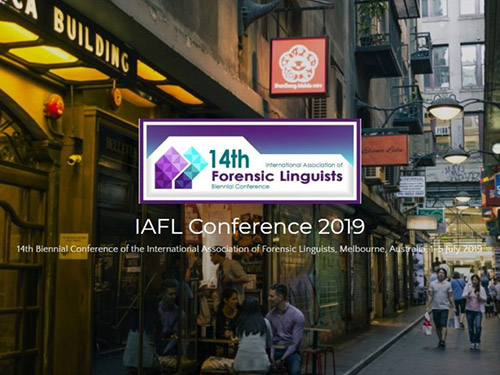This article was originally published on 18 July 2019 at Language on the Move, a peer-reviewed sociolinguistics research site devoted to multilingualism, language learning and intercultural communication in the contexts of globalization and migration. It was authored by Hub members Laura Smith-Khan and Alexandra Grey. It discusses presentations made at the most recent Biennial Conference of the International Association of Forensic Linguists in Melbourne, Australia.
The conference brought together a broad range of researchers from across the globe, interested in a variety of language-related issues in diverse legal contexts. However, despite this diversity, a clear issue emerged amongst the many presentations: the importance of tackling problematic beliefs about language in a format that is accessible and perceived as legitimate by those working in legal settings.
Reading from the introduction of her new book, Researching Forensic Linguistics, the immediate past president of IAFL, Georgina Heydon [Royal Melbourne Institute of Technology], noted that miscarriages of justice sometimes arise because of “misconceptions about how language works.” Further, while legal professionals may be adept experts in using language, this does not make them languages experts in the same was as linguists. This not only means they are “ill-equipped to provide linguistic expertise” but “are also largely unaware that linguistic expertise even exists.”
Beliefs and misconceptions about language are theorised as “language ideologies” by sociolinguists; they are the “taken-for-granted assumptions about how language works,” which inform the way people like lawyers, judges and police officers conduct their work. Language ideologies help shape the expectations such people have about communication, in ways that may impact their decision-making, such as whether a speaker is proficient enough in a particular language to participate in a police interview or appear as a court witness, or requires an interpreter. Some of the conference presentations directly identified and tackled language ideologies, while many others sought to contribute evidence to correcting them.
- Continue reading Smith-Khan’s and Grey’s thought-provoking commentary about language and lawyers.
- Learn how speakers of indigenous languages in Australia may face injustice due to language barriers in another co-authored commentary by Smith-Khan and Grey, “Language and Indigenous Disadvantage.”
